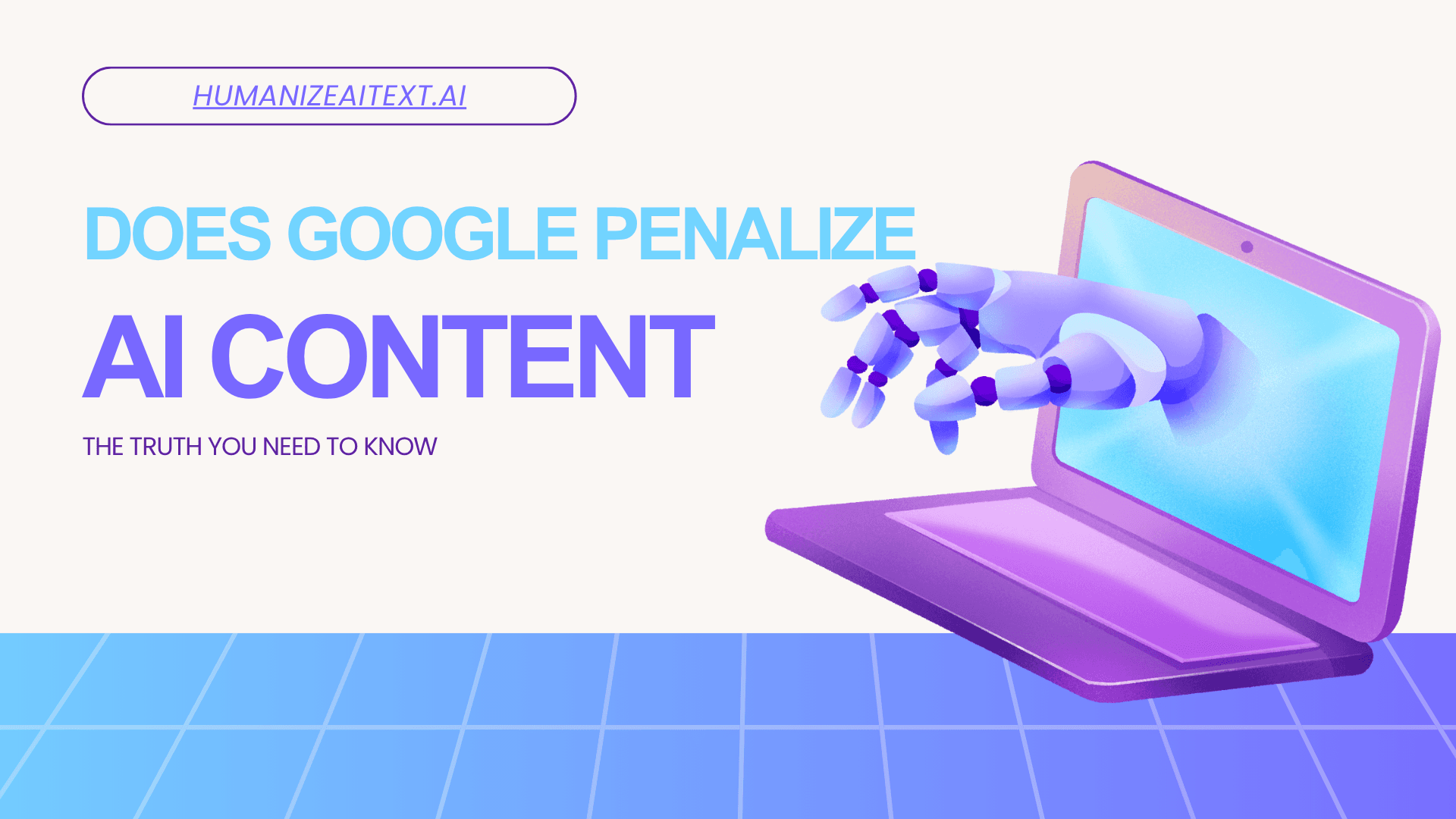AI is taking the content creation world by storm. Tools like ChatGPT, Jasper, and other AI-driven platforms have made it easier than ever to create high-quality content at scale. But with all this automation, a big question lingers in the air: Does Google penalize AI content?
You might have heard different things—from some people claiming AI content is doomed to fail in Google’s eyes, to others saying it’s a game changer for SEO. So, let’s break it down in a way that makes sense and gets to the heart of the matter.
Google’s Stance on AI Content: Is it Really Penalized?
Let’s clear something up right away: Google does not directly penalize AI-generated content. That’s right—using AI to write your blog posts, product descriptions, or even social media content isn’t inherently against the rules. In fact, Google has been using automation and AI in its own systems for years. They’re just more concerned with the quality of the content than whether it was written by a human or an algorithm.
Now, that’s not to say Google just lets anything slide. If the content is thin, spammy, or simply there to manipulate rankings (think: keyword stuffing, irrelevant articles, or low-quality information), it doesn’t matter who wrote it—it’s not going to perform well. So, if you’re planning to use AI to generate content, you need to make sure it’s helpful, high-quality, and designed to serve your audience’s needs.
How Does Google Detect AI Content?
Here’s where things get interesting. While Google doesn’t outright penalize AI content, it can spot low-quality AI-generated content. This isn’t about AI being “detected” per se—it’s more about the overall quality of the content. Google has sophisticated algorithms that can determine if content is spammy, lacks depth, or doesn’t align with user intent. And guess what? AI-generated content that falls into those categories gets flagged, regardless of how it was created.
For example, Google’s algorithms are excellent at picking up on content that feels robotic, shallow, or overly optimized for SEO. If your content doesn’t offer real value to users or seems like it was churned out just for the sake of ranking, it’s probably not going to perform well.
In fact, Google’s algorithm updates, like the Helpful Content System, have made it pretty clear that content written with a people-first approach is what they prioritize. This means content should be original, relevant, and, most importantly, useful to the reader. AI-generated content that fails this test might struggle to rank.
Does Google Penalize AI Content?
No, Google doesn’t penalize AI content outright, but it does penalize low-quality content, whether it’s AI-generated or written by a person. If you’re using AI to create content, you still need to ensure it’s meeting the same high standards that Google expects from any content.
Let’s dive into the key points of what Google looks for in content:

Google's AI content checklist
- Relevance: Is the content aligned with the user’s search intent?
- Quality: Is it original and well-written, or does it feel like something just thrown together?
- User Experience: Is it engaging? Does it answer the user’s question, or is it just filled with fluff?
If your AI content doesn’t meet these standards, it’s not going to do well—simple as that. However, high-quality AI content that serves these purposes is more than capable of ranking well.
The Role of Human Touch in AI-Generated Content
So, can AI-generated content rank? Absolutely—but here’s the thing: AI content needs to be refined. AI tools can give you a strong starting point, but if you want to ensure that your content resonates with both users and Google, you need to add your own human touch.
AI tools like Humanize AI Text can help with this process. They can refine AI-generated content, making it flow more naturally and read more like something a human would write. This is essential because Google loves content that feels human—it values authenticity, expertise, and trustworthiness (E-E-A-T).
Think of AI as your assistant, not your replacement. If you use AI to create the skeleton of an article, but you refine it to make it unique, engaging, and aligned with user intent, then you’re on the right track.
How Google Handles Low-Quality AI Content: Real-Life Examples
There’s been a lot of talk about how Google handles AI content, and real-life examples show us how the algorithm reacts to low-quality, AI-generated content.
Let’s take a quick look at a case study:
- Keyword: “SEO training Houston”
- Content: AI-generated, quick and generic content designed just to rank.
- Result: The content was flagged, deindexed, and removed from Google’s search results.
This isn’t because it was AI content—it was because the content lacked value. It was low-quality, generic, and didn’t offer the user anything helpful. After being removed from the index, the content was replaced with a human-written piece that was higher in quality and more informative. Within hours, it was re-indexed and began to rank again.
This tells us something important: It’s not the AI that’s the problem—it’s the quality of the content. If you use AI tools to produce content that’s shallow or lacks depth, it’s not going to perform well. But when you add a human touch to that AI content, ensuring it’s high-quality and meets user intent, you’ll see better results.
The Key to Winning with AI Content
So, how can you make sure your AI-generated content wins with Google? Here’s what you need to keep in mind:

AI Content Vs Humanize Content
- Focus on Quality Over Quantity Just because you can generate content quickly with AI doesn’t mean you should churn out tons of it. Google’s algorithms prioritize high-quality, in-depth content over spammy, keyword-stuffed content. If you focus on quality first, you’ll see better results.
- Human-Refined AI Content As mentioned earlier, using AI tools like Humanize AI Text can help refine your content. It turns basic AI-generated text into something that sounds natural and human, which is what Google loves.
- Serve User Intent Always ask yourself: What does the user want from this content? If you focus on serving the user’s needs, you’ll align your content with what Google wants to show in search results. Whether you’re answering a question or solving a problem, ensure that your content is valuable.
- Avoid Spammy Practices Google is very clear about penalizing spammy, manipulative content. If you’re using AI, don’t use it to game the system—create content that’s meant to be genuinely helpful, not just a shortcut to rankings.
- Follow E-E-A-T Guidelines Google loves content that showcases expertise, experience, authoritativeness, and trustworthiness. Whether your content is AI-generated or written by a human, make sure it aligns with these guidelines. AI can be great at assisting with content creation, but you still need to add the human elements of trust and authenticity.
How to Optimize AI Content for Better Search Rankings
While AI-generated content can be valuable, optimizing it for SEO is essential to ensure it performs well in Google’s search results. Here are some strategies to help you optimize your AI content effectively:
- Ensure the Content is Aligned with User Intent Google’s algorithms prioritize content that addresses the user’s search query directly. When using AI to create content, make sure it answers the question or solves the problem that the user is searching for.
- Focus on Content Structure and Readability AI can help produce large volumes of content, but it’s important to focus on how the content is structured. Break down your content with headings, bullet points, and clear paragraphs to make it easy to read. This enhances user experience and helps Google understand your content better.
- Incorporate Internal and External Links Adding internal links to other relevant content on your website improves navigation and helps Google’s bots crawl your site more effectively. Including external links to authoritative sources also adds credibility and context to your AI-generated content.
- Use Semantic Search and NLP Optimization AI-generated content can benefit from Natural Language Processing (NLP), which focuses on meaning and context rather than just keywords. Use tools that help you optimize for NLP, ensuring that the content covers the topic comprehensively and naturally.
By implementing these strategies, AI content can be optimized to perform well in Google’s search results.
The Role of AI Content in Scaling Content Creation
One of the main advantages of AI is its ability to help businesses scale content creation without sacrificing speed or efficiency. But, it’s important to use AI as part of a balanced content strategy. Here's how AI can be beneficial for scaling your content:
- Increased Productivity: AI tools can generate high-quality drafts in a fraction of the time it would take a human writer. This helps businesses meet their content demands, especially when dealing with large volumes of content.
- Consistent Quality: When used correctly, AI can help maintain consistency across all of your content. It ensures that your brand voice is preserved and that content follows the same structure and tone, making scaling content creation more efficient.
- Cost-Effective: AI can reduce the need for a large content team, making it an excellent option for businesses on a budget. However, while AI can handle a large portion of the content, human editors should still be involved to ensure quality.
However, scaling with AI requires a careful balance. While AI can produce high volumes, it’s crucial to mix in high-quality, human-generated content that adds depth, expertise, and authority to your site.
Can AI Content Impact Brand Authority?
When it comes to SEO, E-E-A-T (Experience, Expertise, Authoritativeness, and Trustworthiness) is an essential factor for ranking well in Google. AI-generated content, if not carefully curated, can sometimes lack the expertise and authority that Google values. However, with the right strategy, AI can support your brand’s authority and enhance trustworthiness.
Here’s how AI can impact your brand’s authority:
- Expert-Generated AI Content Combining AI with industry experts can help create content that holds authority. For example, using AI to generate the base of a blog post and then having an expert review, fact-check, and add their insights can result in high-quality content that builds your brand’s credibility.
- User-Centered AI Content Google values user-centered content. With AI, you can produce content that is highly relevant to your audience’s needs. When you align AI content with the questions and problems your target audience faces, it can lead to higher engagement and, ultimately, trust and authority.
- Integrating AI with a Human Voice Content that incorporates both AI efficiency and human insight fosters trust and authority. Using AI for research, data generation, or brainstorming, and then having a human writer add personal experience and perspective, can make a huge difference.
Remember, brand authority isn’t built overnight. It requires time, effort, and consistency, but with the right combination of AI-generated and human-curated content, you can establish trust and authority.
The Future of AI Content in SEO
As AI continues to evolve, its role in SEO is expected to grow. Google’s algorithms are becoming increasingly sophisticated, and the technology is being refined to better understand and evaluate AI-generated content. So, what’s the future of AI content in SEO?
- Better Detection of High-Quality AI Content Google’s algorithm will likely become better at distinguishing between high-quality AI content and low-quality AI-generated text. As AI technology improves, Google may start to reward AI content that provides value, while continuing to penalize content that feels robotic, spammy, or thin.
- Integration with Semantic Search Google’s transition to semantic search means it will focus more on understanding the meaning behind search queries and content, rather than just looking at keywords. AI, with its ability to understand context and meaning, will become even more important in creating content that matches search intent and aligns with Google’s goals.
- Personalized AI Content As AI improves, content will become even more personalized. AI tools will help you create content that is tailored to specific audiences and search queries. This will be key for ranking in an increasingly competitive digital landscape.
- Ethical and Transparency Considerations As AI-generated content becomes more mainstream, there will likely be more discussion about ethics and transparency. Users may want to know whether content is AI-generated, and ethical guidelines will be needed to ensure that AI is used in ways that benefit both users and the creators of the content.
In conclusion, the future of AI in SEO looks promising, but it will require a focus on quality, human involvement, and ethical considerations to truly thrive.
Why Humanize AI Text is a Suitable Option for AI Content Creation
When it comes to creating AI-generated content that stands out in Google’s search results, Humanize AI Text offers a solution that bridges the gap between automation and high-quality content. While AI tools like ChatGPT and Jasper are excellent for generating text quickly, they often need a little polish to meet Google’s standards for user experience, relevance, and quality. Here’s why Humanize AI Text could be the perfect tool to elevate your AI content and help you avoid penalties:
1. Refines AI Content for Natural Flow
AI-generated content can sometimes feel mechanical or stiff. Google values content that reads naturally and is engaging for users. Humanize AI Text helps to humanize your AI-generated content, ensuring that it flows smoothly, sounds conversational, and resonates with readers. By refining the text, it ensures your content aligns with Google’s Helpful Content System and E-E-A-T (Expertise, Authoritativeness, and Trustworthiness) guidelines.
2. Boosts Content Quality Without Sacrificing Efficiency
One of the biggest challenges with AI-generated content is ensuring that it doesn’t compromise on quality. With Humanize AI Text, you can take the speed and efficiency of AI content creation and improve its quality by adding human-like elements. The tool helps refine the structure, remove robotic language, and add necessary context, turning good content into something exceptional.
3. Aligns Content with Search Intent
Creating content that matches the user’s search intent is crucial for SEO success. Humanize AI Text helps you ensure that your AI-generated content addresses specific user needs, making it more likely to rank well. Whether you're targeting informational, transactional, or navigational queries, this tool can help you optimize your content to serve the user’s intent better.
4. Scales Content Creation Without Losing Human Touch
AI has the potential to dramatically increase your content output, but scaling content creation while maintaining quality is tricky. Humanize AI Text strikes the perfect balance by allowing you to create large volumes of content quickly, while ensuring that each piece remains high-quality and reader-friendly. This makes it an excellent solution for businesses that need to scale content creation without sacrificing brand voice or content quality.
5. Supports Ethical AI Content Creation
As AI content becomes more prevalent, questions about ethics and transparency will continue to arise. Humanize AI Text gives you an ethical way to leverage AI by ensuring that the content is valuable, authentic, and relevant. It ensures that your AI-generated text aligns with Google’s policies and ethical standards, reducing the risk of it being flagged or penalized.
Final Thoughts
Google does not penalize AI content directly, but it does penalize low-quality content. Whether your content is AI-generated or written by a human, the focus should always be on quality. If your AI content is useful, relevant, and written with the user in mind, it can rank just as well as human-generated content.
So, don’t shy away from using AI to create content. Embrace it, but make sure you refine it, add your human touch, and ensure it’s aligned with user intent and Google’s guidelines. If you do this, you’ll have no problem making AI-generated content work for you in the world of SEO.
Frequently Asked Questions
1. Can Google detect AI-generated content?
Yes, Google can detect low-quality AI-generated content, especially if it’s spammy or doesn’t serve the user’s needs. However, high-quality AI content that adds value is not penalized.
2. Is AI-generated content penalized by Google?
Not directly. Google doesn’t penalize AI content outright, but it does penalize low-quality or spammy content. The key is ensuring the content is high-quality and useful to users.
3. How can I make AI-generated content better for SEO?
You can improve AI-generated content by refining it with human input. Use tools like Humanize AI Text to make the content flow more naturally, and ensure it aligns with user intent and Google’s quality guidelines.
4. Can AI content rank on Google?
Yes, AI content can rank on Google if it meets the quality standards Google expects. It’s all about creating helpful, high-quality content that serves the user’s needs.
5. What are Google’s guidelines for AI content?
Google’s guidelines emphasize the importance of content that is helpful, relevant, and valuable to users. As long as your AI-generated content aligns with these guidelines, it can perform well in search rankings.


